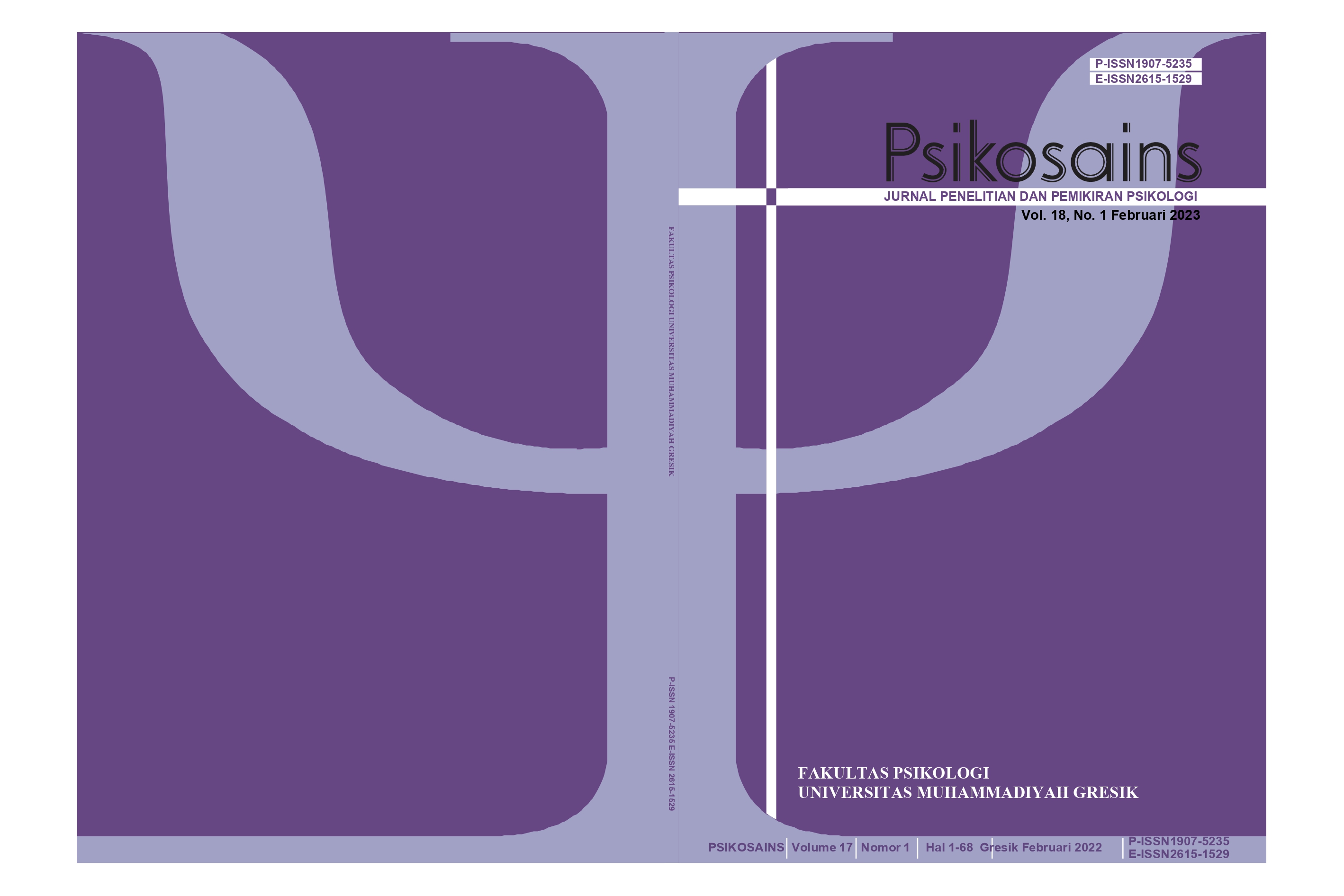Dinamika Permasalahan Psikososial Masa Quarter Life Crisis Pada Mahasiswa
DOI:
https://doi.org/10.30587/psikosains.v18i1.5316Keywords:
Early Adulthood, College Students, Psychosocial Problems, Quarter Life CrisisAbstract
Each student show a different response to serve in stages of human development early adulthood. If student don’t serve well, a student will experience quarter life crisis which also causes psychosocial problems arise. The purpose of this study was to determine the dinamic of psychosocial problems in individual facing quarter life crisis. This study uses a qualitative method with a case study approach. The number of participants wa three people and three informants who were close friends of the participants. Data were collected using semi-structures interviews and observations made during the interview process as a complement. The data were analyzed by data reduction, data display, and conclusion drawing. The results show that the ynamics of psychosocial problems in students who are facing a quarter-life crisis begins with the existence of a situation or event encountered that disrupts the psychosocial condition of the participants. Then the participant will try to survive and live the condition until finally the participant cannot do anything. Furthermore, psychosocial problems in participants who face a quarter life crisis have a negative impact both physically and mentally. Responses or ways to deal with psychosocial problems for each participant varied from sleeping, social withdrawal, to smoking. However, the participants continued to live their lives according to their abilities.
References
Afnan, A., Fauzia, R., & Tanau, M. U. (2020). Hubungan efikasi diri dengan stress pada mahasiswa yang berada dalam fase quarter life crisis. Jurnal Kognisia, 3(1), 23–29. https://ppjp.ulm.ac.id/journals/index.php/kog/article/view/1569.
Agustin, I. (2012). Terapi dengan pendekatan solution-focused pada individu yang mengalami quarter life crisis. Universitas Indonesia.
Anshory, I., Yayuk, E., & Worowirastri, D. (2016). Tahapan dan karakteristik perkembangan belajar siswa sekolah dasar (upaya pemaknaan development task). The Progressive and Fun Education Seminar, 383–389. http://eprints.umm.ac.id/42236/21/Anshory AM Yayuk Ekowati - Phases Characteristic Learning Development Elementary Student.pdf.
Arnett, J. J. (2001). Conceptions of the transition to adulthood: Perspectives from adolescence through midlife. Journal of Adult Development, 8(2), 133–143. https://doi.org/10.1023/A:1026450103225.
Arnett, J. J. (2004). Emerging adulthood: The winding road from the late teens
through the twenties. US: Oxford University Press.
Atwood, J. ., & Scholtz, C. (2008). The quarter-life time period: An age of indulgence, crisis or both? Contemporary Family Therapy, 30(4), 233–250. https://doi.org/https://doi.org/10.1007/s10591-008-9066-2.
Black, A. S. (2010). Halfway between somewhere and nothing: "an exploration of the quarter-life crisis and life satisfaction among graduate students. In Proquest Dissertations and Theses (PQDT). University of Arkanas.
Chaplin. (2011). Kamus lengkap psikologi (terjemahan Kartini Kartono). PT. RajaGrafindo Persada.
Council, N. S. (1999). Manajemen stres. Penerbit Buku Kedokteran EGC. https://www.google.co.id/books/edition/Manajemen_Stres/DXzaC7RzxkcC ?hl=id&gbpv=1&dq=stres&printsec=frontcover.
Fischer, K. (2008). Ramen noodles, rent and resumes: An after-college guide to life. SuperCollege LLC.
Gardner, Murphy, & Childs. (1999). A brief including psychosocial problems bubscales. Ambul Child Health, 5, 225–236.
Harahap, N. (2020). Penenlitian kuantitatif. Wal ashri Publishing.
Hurlock, E. B. (1996). Psikologi perkembangan. Erlangga.
Jellinek, M. S., Murphy, J. M., Little, M. M., Maria, E., Pagano, M., Diane, M., Comer, D., & Kelleher, K. J. (1999). Use of the pediatric symptom checklist to screen for psychosocial problems in pediatric primary care: A national feasibility study. Archives of Pediatric and Adolescent Medicine, 153(3), 254–260. https://www.ncbi.nlm.nih.gov/pmc/articles/PMC3905751/pdf/nihms539062. pdf.
Kemenkes RI. (2019). Pusat data dan informasi kementerian kesehatan RI: Situasi kesehatan jiwa di Indonesia.
Nash, R., & Murray, M. . (2010). Helping college students find purpose: The campus guide to meaning-making. Jossey-Bass.
Nevid, J. S., Rathus, S. A., & Greene, B. (2014). Psikologi abnormal. Erlangga.
Nevid, J. S., Rathus, S. A., & Greene, B. (2018). Psikologi abnormal: Di dunia yang terus berubah (9th ed.). Erlangga.
Papalia, D. ., & Feldman, R. . (2014). Menyelami perkembangan manusia. Salemba Humanika.
Pujiastuti, E., Fadlyana, E., & Garna, H. (2013). Perbandingan masalah psikososial pada remaja obes dan gizi normal menggunakan pediatric symptom checklist (PSC)-17. Sari Pediatri, 15(4), 201–206. https://doi.org/10.14238/sp15.4.2013.201-6.
Putri, A. P. K., & Septiawan, A. (2020). Manajemen kecemasan masyarakat dalam menghadapi pandemi covid-19. Academica: Journal of Multidiciplinary Studies, 4(2), 199–216.
Robbins, A., & Wilner, A. (2001). Quarterlife crisis: The unique challenges of life in your twenties. Tercher Penguin.
Rusman, A. D. P., Umar, F., & Majid, M. (2021). Covid-19 dan psikososial masyarakat di masa pandemi. NEM. https://books.google.co.id/books?id=oTMXEAAAQBAJ&dq=psikososial&l r=&source=gbs_navlinks_s
Santrock, J. (2003). Adolescence, edisi 6. Erlangga. https://www.google.co.id/books/edition/Adolescence_edisi_6/Z3LWS- xbTv4C?hl=id&gbpv=1&dq=ericson+psikososial&pg=PA46&printsec=fro ntcover.
Santrock, J. W. (2011). Life span development (perkembangan masa hidup). Erlangga.
Sugiyono. (2013). Metode penelitian kuantitatif, kualitatif, dan R&D. Alfabeta.
Supratiknya. (2005). Teori-teori psikodinamik (klinis). Kanisius.
Thahir, A. (2018). Psikologi Perkembangan. Aura Publishing.
Wahidmurni. (2017). Pemaparan metode penelitian kualitatif. Fakultas Ilmu Tarbiyah dan Keguruan UIN Maulana Malik Ibrahim Malang.
Winkel, W. (2014). Psikologi pengajaran. Grasindo.
Yudiantoro, H. (2020). Gambaran masalah psikososial pada taruna muda politeknik ilmu pemasyarakatan selama study from home. Jurnal Ilmu Keperawatan Jiwa, 3(4), 431–438.



